 Cultivating truth, goodness, and beauty grounded in the Christian worldview
Cultivating truth, goodness, and beauty grounded in the Christian worldview Cultivating truth, goodness, and beauty grounded in the Christian worldview
Cultivating truth, goodness, and beauty grounded in the Christian worldview
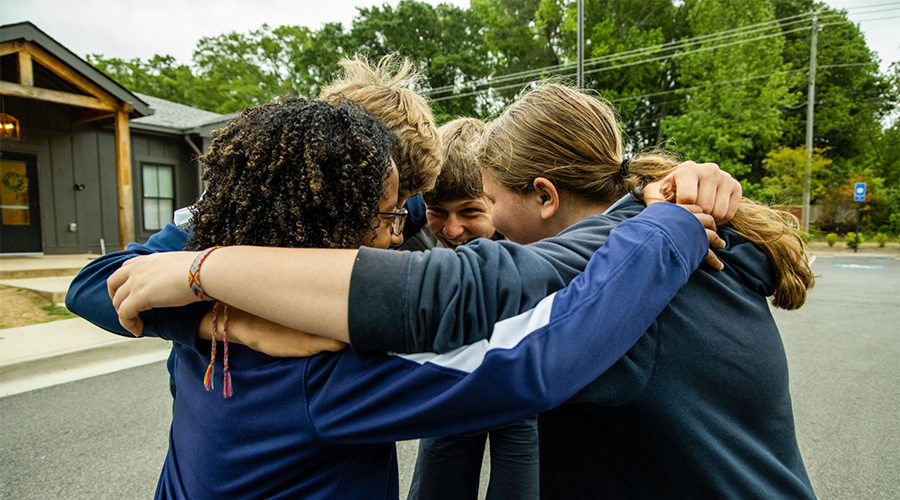
In 1 Thessalonians 5:18, the apostle Paul commands Christians to, "give thanks in all circumstances." We have had an intentional year-long focus with our students on the virtue of gratitude. The Bible is clear on the subject; "Oh give thanks to the Lord", "be thankful", and "come before him with thanksgiving" (Psalm 136:1, Colossians 3:15, and Psalm 95:2). God's standard is high in this regard; Christian people are to be living in a permanent state of gratitude.
How do we nurture grateful children? As educators, we believe that gratitude can be trained as a habit. Students are expected to thank their teacher at the end of class. We do not ask them to do so only when they "mean it." Certainly the ultimate goal is that they will be genuinely grateful. However, we trust that often the first step towards this general disposition is an enforced habit or expectation.
As we near the finish line of another great school year, I challenge all of our parents, teachers, and staff to find all that we can to praise remembering that gratitude is commanded "in all circumstances." C.S. Lewis weighs in saying, "I had not noticed how the humblest and at the same time most balanced and capacious minds praised the most, while the cranks, misfits, and malcontents praised least. The good critics found something to praise in many imperfect works... The healthy and unaffected man, even if luxuriously brought up and widely experienced in good cookery, could praise a very modest meal... praise almost seems to be inner health made audible."
In her article "Why It's So Important to Show Gratitude at Work", professor Sara Algoe argues that, "while showing gratitude isn't difficult... the nuances can make all the difference." She proceeds to give four practical tips on how to best demonstrate gratitude for others. I find each of these particularly helpful in how we as parents and teachers ought to express gratitude to our children.
Her first point is that even just a small expression of gratitude can go a long way. "The fact is that all it takes is some acknowledgement of another person's work—a brief email, Slack message or passing comment in the hallway—to see beneficial effects."
Second, make sure that when we are thanking someone, we keep the focus on the other person and what they have done. She imagines a scenario where a colleague has covered a meeting for someone and compares the impact in two potential responses:
One recognizes clearly that the second response is more effective as it keeps the focus on the efforts of the other person and makes them "feel more valued."
Her third point seems to be the most obvious. Our gratitude needs to be real and genuine... "Do they seem to truly understand,validate and care about the person they're thanking?" So, how can we make our gratitude more genuine? She recommends that you express it when you feel it and focus on specific things. "By staying specific about what you found particularly great or noteworthy about the person's actions, it is easier to make them feel valued."
Fourth, there are certain occasions when it is powerful to express gratitude publicly. This will not only impacted the recipient but it will have a secondary benefit of encouraging others in the group to follow this example.
Hat Tip: Jungrok King
Article Link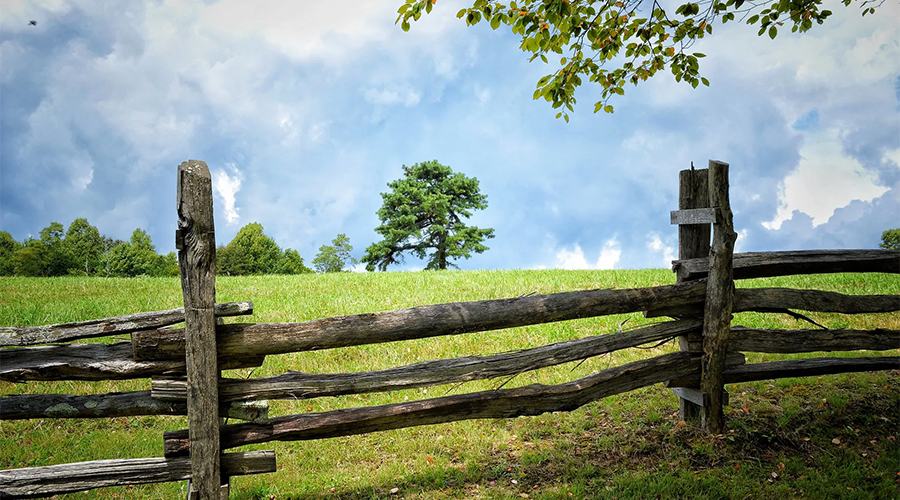
One of the guiding principles of progressive education is to do away with any and all philosophies that don't seem to have a modern purpose. One of the architects of the modern school, John Dewey, argued for continual reform saying, "If we teach today's students as we taught yesterday's we rob them of tomorrow." Latin, great books, logic, cursive, rhetoric and diagramming sentences are a few of the academic disciplines that modern educators have decided will "rob them of tomorrow."
However, classical Christian education respects the principle of what has been called Chesterton's fence. In his book The Thing, G.K. Chesterton says, "There exists in such a case a certain institution or law; let us say, for the sake of simplicity, a fence or gate erected across a road. The more modern type of reformer goes gaily up to it and says, "I don't see the use of this; let us clear it away." To which the more intelligent type of reformer will do well to answer: "If you don't see the use of it, I certainly won't let you clear it away. Go away and think. Then, when you can come back and tell me that you do see the use of it, I may allow you to destroy it." This is wisdom that is needed not only for schools but also for our society in general. In a culture that is yearning to tear down a proverbially useless fence, we need to first consider a reason for its existence.
Article Link
From athletics to academics, we recognize the importance of skill development. Leadership books celebrating the value in developing "marketable" skills are a dime a dozen. However, this obsession with skills has permeated the educational landscape so much that it is having a deleterious effect on the crucial prerequisite for skill development; knowledge. Proverbs 18:15 says, "An intelligent heart acquires knowledge, and the ear of the wise seeks knowledge." Before a child can analyze, compare, and synthesize, they must have a fundamental knowledge of the world around them.
In her The Atlantic article "Elementary Education Has Gone Terribly Wrong," journalist Natalie Wexler laments this trend saying, "American elementary education has been shaped by a theory that goes like this: Reading—a term used to mean not just matching letters to sounds but also comprehension—can be taught in a manner completely disconnected from content... In the meantime, what children are reading doesn't really matter—it's better for them to acquire skills that will enable them to discover knowledge for themselves later on than for them to be given information directly, or so the thinking goes. That is, they need to spend their time "learning to read" before "reading to learn.""
At Stonehaven, we believe that the younger years of a child's education, what we call the grammar phase, must be primarily focused on the acquisition of knowledge versus the accumulation of skills. For it is upon this foundation of knowledge that we can then equip our children with the valuable skills that make them productive citizens in God's kingdom.
In her persuasive essay, "The Lost Tools of Learning," Sayers articulates the importance of knowledge in the grammar phase when "one enjoys the mere accumulation of things."
Article LinkRecitation aloud should be practiced—individually or in chorus; for we must not forget that we are laying the groundwork for Disputation and Rhetoric.
A set of dates to which one can peg all later historical knowledge is of enormous help later on in establishing the perspective of history.
What that material actually is, is only of secondary importance; but it is as well that anything and everything which can usefully be committed to memory should be memorised at this period, whether it is immediately intelligible or not. The modern tendency is to try and force rational explanations on a child's mind at too early an age. Intelligent questions, spontaneously asked, should, of course, receive an immediate and rational answer; but it is a great mistake to suppose that a child cannot readily enjoy and remember things that are beyond its power to analyse—particularly if those things have a strong imaginative appeal (as, for example, Kubla Khan), an attractive jingle (like some of the memory rhymes for Latin genders), or an abundance of rich, resounding polysyllables (like the Quicunque Vult).
At the grammatical age, therefore, we should become acquainted with the story of God and Man in outline—i.e., the Old and New Testament presented as parts of a single narrative of Creation, Rebellion, and Redemption—and also with "the Creed, the Lord's Prayer, and the Ten Commandments." At this stage, it does not matter nearly so much that these things should be fully understood as that they should be known and remembered. Remember, it is material that we are collecting.

We live in a culture and generation that is yearning to "change the world" and "make a difference." Such sentiments have certainly been exalted and reinforced in our churches and schools. Unfortunately, many young people are forming an unhealthy vision for what it means to change the world. It is common to find a 20-year-old questioning their value and purpose if they aren't storming the world with political action. In his article The Glory of Plodding, pastor Kevin DeYoung cautions against this view of change, "My generation in particular is prone to radicalism without followthrough. We have dreams of changing the world... What the church and the world needs, we imagine, is for us to be another Bono—Christian, but more spiritual than religious and more into social justice than the church."
As we look back over thousands of years of human history we see that the majority of one's life is necessarily and appropriately mundane; changing diapers, doing math homework, tilling the ground, and washing dishes. Although such tedious efforts often feel insignificant, this is this glorious vision of world change that we want to elevate for our children. DeYoung lauds the normal life, "Life is usually pretty ordinary, just like following Jesus most days. Daily discipleship is not a new revolution each morning or an agent of global transformation every evening; it's a long obedience in the same direction... Put away the Che Guevara t-shirts, stop the revolution, and join the rest of the plodders. Fifty years from now you'll be glad you did." So when we are telling our children how to change the world, might we remember these two words; "Plod on!"
Article Link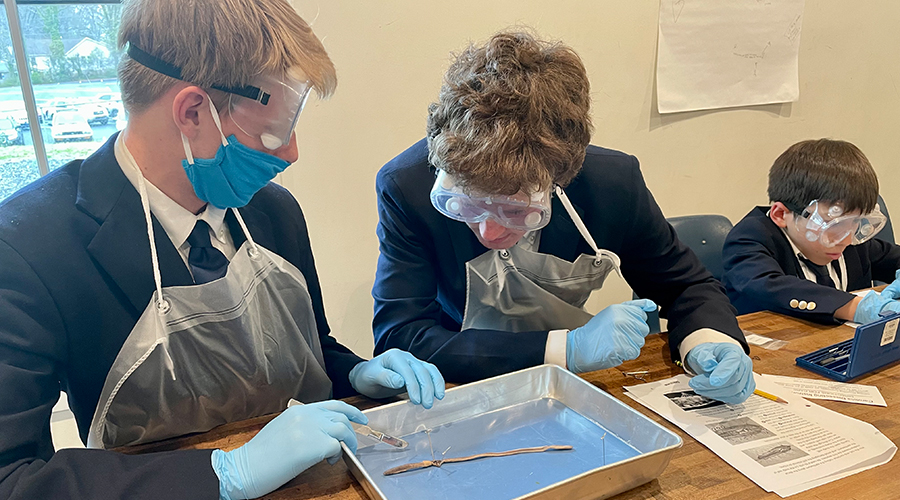
In the Upper School, the Biology students recently discussed apex predators. It would seem logical that if you removed a predator from an ecosystem, this would allow more species to live, but the opposite is true. After Yellowstone National Park reintroduced the gray wolf, an apex predator, back into the habitat, the huge population of deer decreased which resulted in the growth of more trees which attracted more birds and resources for the beavers to build dams which changed the creeks which supported more fish... well you get the idea. The importance of the apex predator in preserving life reveals God's wisdom. This discussion of an ecological concept turned into a discussion of the character of God.
"Where were you when I laid the foundation of the earth? Tell me, if you have understanding" Job 38:4.
"'For my thoughts are not your thoughts, neither are your ways my ways,' declares the LORD" Isaiah 55:8.
"But God chose what is foolish in the world to shame the wise; God chose what is weak in the world to shame the strong" 1 Corinthians 1:27.
The application of Scripture within this science lesson is an example of Scriptural Integration. One of the areas in which we have challenged our teachers is to look for ways to integrate Biblical truth into each lesson. This requires the discipline of contemplation as they look for God's fingerprints in the subjects they teach. What are the deeper truths hidden within the lesson? What do we learn about God and human nature by studying the virtues and vices of the characters in a story? How does the study of math reveal God's character? These are the types of questions we want our teachers to be asking our students so that our students will learn to recognize God's fingerprints in their school work and in their everyday lives. In what ways do you use Scriptural Integration in your home? Our hope is that we can work together to help our children grow in grace and knowledge of our Lord!

Jesus' first words upon appearing to his disciples after his resurrection are surely significant. After all, he could have first rebuked Peter for disowning him, or criticized his followers for their lack of faith. Instead, John's Gospel tells us, Jesus first says, "Peace be with you" (John 20:19). After showing his disciples the wounds in his hands and his side, Jesus speaks again: "Peace be with you" (John 20:20). This twofold repetition points us to the heart of the Paschal mystery, our Easter hope.
On the one hand, Jesus is quite clear that he does not promise us peace as the world understands it; as he says shortly before his passion, to his disciples in the Upper Room, "If the world hates you, know that it has hated me before it hated you. If you were of the world, the world would love you as its own; but because you are not of the world, but I chose you out of the world, therefore the world hates you" (John 15:18-19). Our post-Christian society, in which traditional Christian beliefs are increasingly judged "hateful" or "harmful," is perhaps bringing this truth home to us in ways that previous generations of American Christians may not have understood.
Easter, however, reminds us that we need not despair. As Jesus goes on to tell his disciples, "I have said these things to you, that in me you may have peace. In the world you will have tribulation. But take heart; I have overcome the world!" (John 16:32). The peace that Christ promises comes, not from worldly circumstances, but from Christ himself, who by his resurrection and ascension now reigns as King. Christ's victory over sin and death is why the Apostle Paul can tell us, "Do not be anxious about anything, but in everything by prayer and supplication with thanksgiving let your requests be made known to God. And the peace of God, which surpasses all understanding, will guard your hearts and your minds in Christ Jesus" (Phil 4:6-7). May we be an Easter people, resting in the peace given to us by our Lord and Savior Jesus Christ!
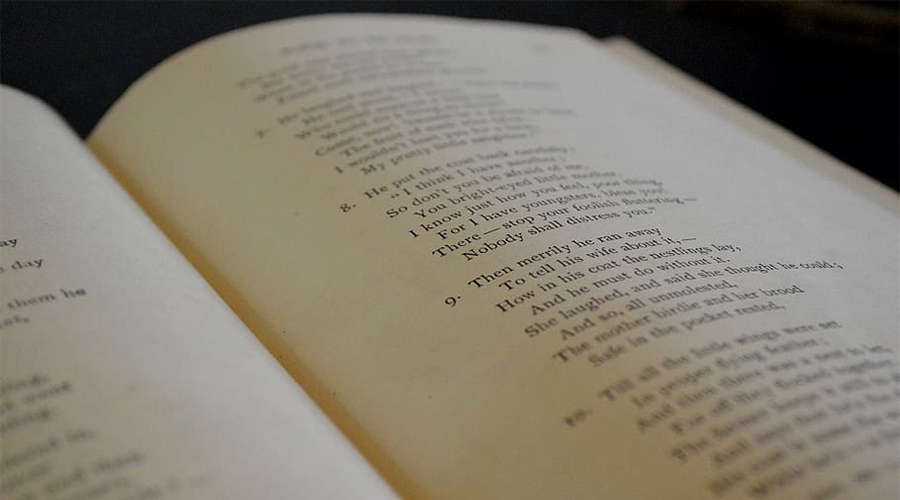
The value of poetry seems to create an internal struggle in the modern mind. We know deep down it is good and beautiful but we can't help but find it at least a little unnecessary. At worst, it is seen as a complete waste of time. In her New York Times article Memorize that Poem!, University of North Carolina history professor Molly Worthen, makes a case for the value in memorizing and reciting poetry. She says, "The truth is that memorizing and reciting poetry can be a highly expressive act." A 1902 handbook for teaching English recognized that reciting poetry, "stocked the mind with the priceless treasure of the noblest thoughts and feelings." Do we not desire our children to be contemplating the "noblest thoughts and feelings" of history? Edgar Allen Poe said, "I would define, in brief, the poetry of words as the rhythmical creation of Beauty."
If a person owned an original Rembrandt painting, I would expect the painting to be displayed prominently for others to enjoy. We have beautiful word paintings no further than our bookshelves and yet we too often fail to share them with our children. Unfortunately, modern education neglects the teaching of poetry. Stonehaven's poetry competition this Thursday is one of the many ways we seek to cultivate a love for words in our children. What better way to ignite a passion for words than meditating upon the most beautiful expressions of humanity? Worthen concludes, "It's time we show we care about words again, to rebuild our connection to a civilization so much broader than our Twitter feeds."
Article Link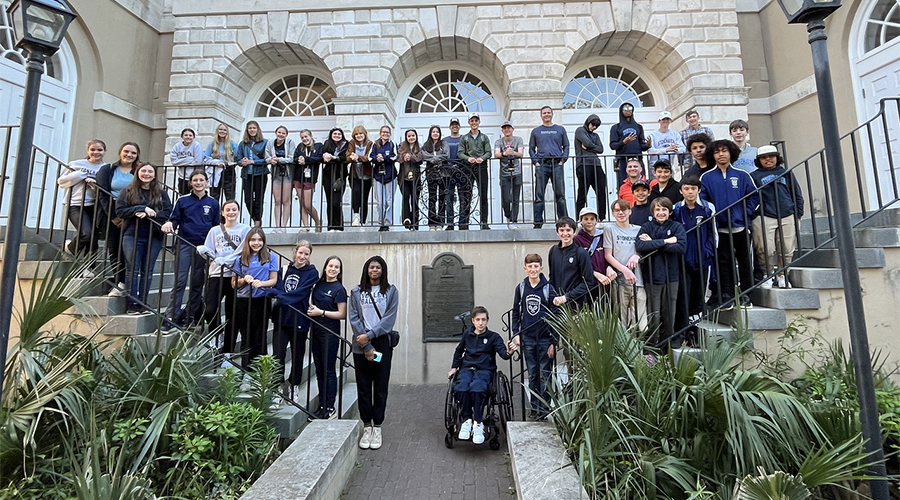
"See the world: It's more fantastic than any dream made or paid for in factories." ― Ray Bradbury, Fahrenheit 451
Last week, Upper School students engaged in virtue development on location: Marietta History Center, Bible History Center, North Georgia mountains, Washington, DC, and Charleston. Not everyone all at once in the same place, of course, but everyone left the campus, yet we're not done. Juniors will take a Civil Rights Tour this spring. Jog your own memories with photos of adorable lower school students at nature centers and gardens, farms and zoos, symphony and ballet, church and monastery, jousting tournaments, nursing home and fire department, and, of course, science, art, and history museums. I will contend these trips are not breaks from learning. Rather, day trips and overnight school trips are a crucial component to corporately cultivating truth, goodness, and beauty.
These outings require seemingly contrasting talents: administration and teachers must organize intensely but improvise in an instant; students balance expectations of fun but anxiety about friends; parents who chaperone juggle the tension between helicoptering and fostering independence. In many ways, staying in the classroom is far easier than taking our community off campus. (If I'm honest, I have the same internal debate about traveling with my own family.)
However, my conclusion is this: Go! Stonehaven trips foster social-emotional development, community memories, experiences with real historical artifacts, and opportunities to share our talents, mission, and joy. Most Stonehaven teachers share a similar experience to this: While I'm managing students in gift shops, restaurants, or under a centuries old live oak tree, strangers approach to remark that our group is notably unique in patience, manners, gratitude, and kindness. Our students are growing in virtue together outside of the classroom whilst blessing others.
"Go, Knights."
